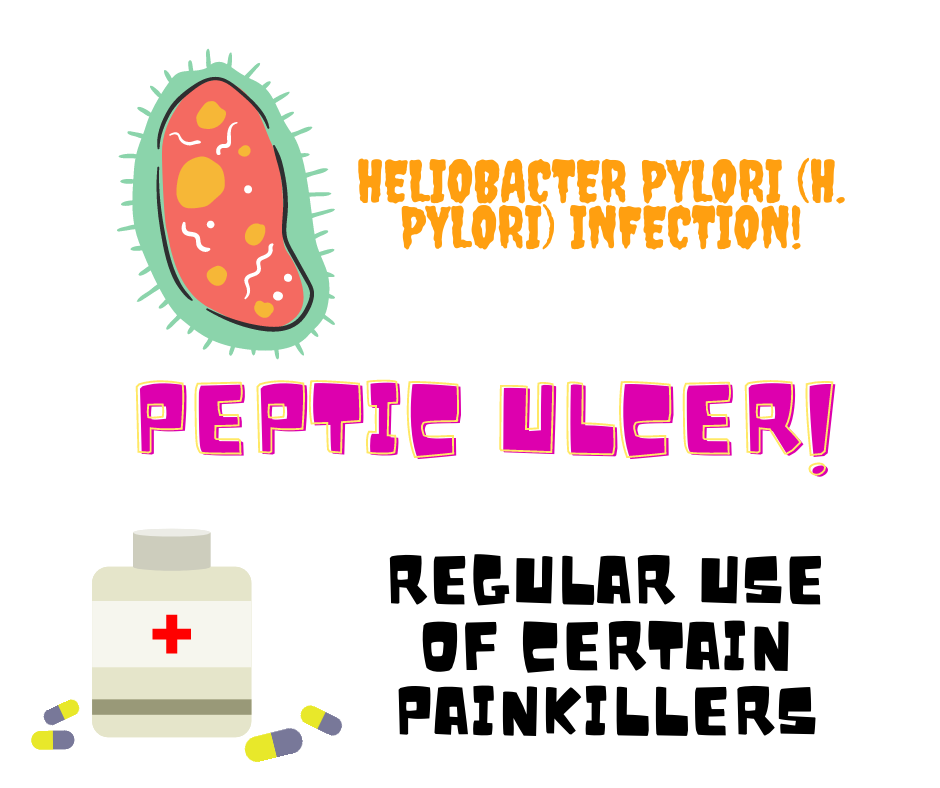Peptic ulcer – what is a peptic ulcer
Peptic ulcer (peptic ulcer disease) represents open sores in the mucous membrane of the lower esophagus, stomach or duodenum mainly as a result of bacterial infection caused by Helicobacter pylori. The most common symptom is severe stomach pain that extends from the navel to the sternum. If left untreated over time, sores get worse . Moreover, it can cause serious complications.
Peptic ulcer symptoms
Symptoms of peptic ulcer depend on the location of the ulcer and the age of the patient, as many patients, especially the older ones, have few or no symptoms at all.
Pain
Pain is the most common symptom of a peptic ulcer, often localized in the epigastrium. It has the character of burning or biting, and can also spread to the back or to the right rib arch, which is usually a sign of complication. Sudden sharp and very severe pain indicates a perforation.
Pain in the duodenal ulcer occurs on an empty stomach and 2 to 3 hours after a meal. It also often occurs during the night. After taking a small amount of food or antacid, the pain stops.
In a gastric ulcer, the pain occurs within one hour of ingestion, and eating out of the desire for relief may further exacerbate the pain.
Other symptoms
Difficult discharge of the gastroduodenum may be due to the localization of an acute ulcer or fibro-stenotic anatomical changes after previous ulcers. In these cases, inappetence (lack of appetite), nausea and vomiting may occur. These symptoms result in weight loss.
Heartburn is common in patients with duodenal ulcer. The appearance of melena (stool as black as tar) or hematemesis (vomiting of fresh, red or only minimal liquid mixed with blood or clotting blood, or vomiting of dark blood) indicates a bleeding ulcer.
Causes and risk factors
It was once believed that peptic ulcers were caused by spicy foods or a stressful life. However, today, the most common causes of stomach ulcers are:

Heliobacter pylori (H. pylori) infection
Although it is not entirely clear how Heliobacter pylori spread, most scientists believe it is most commonly transmitted directly from infected to healthy individuals. It can also enter into the human organism through food and water. This bacterium has several strains and most commonly lives on the gastric mucosa. In most cases, it does not cause problems, but it can cause acute inflammation (gastritis), which then becomes chronic and can cause an ulcer. Moreover, studies show that about 15 to 20% of people infected with H. pylori will develop a gastric or duodenal ulcer, and less than 1% will have cancer or gastric lymphoma.
Regular use of certain painkillers
Certain painkillers from the group of NSAIDs make the stomach or duodenal mucosa more susceptible to injury. For example, these are medicines like ketoprofen, ibuprofen, diclofenac, indomethacin and others. To clarify, approximately 30% of adults who regularly use these drug groups experience side effects on the digestive system.
Risk factors for gastric ulcer are:
Smoking and alcohol consumption – Both bad habits stimulate the stomach to produce more acid than usual. If a person also has an H. pylori infection, the risk of developing a peptic ulcer is even greater, Avoid them at all cost.
Cocaine and methamphetamine intake – These narcotics restrict blood flow to the gastric mucosa, preventing its normal functioning, Avoid using them.
Viral diseases – Viruses, such as cytomegalovirus and herpes, especially in the elderly and those whose immunity is already compromised can increase the risk of peptic ulcer development
Emotional stress – especially if occurs frequently
Treatment
The type of therapy will certainly depend on the cause of the ulcer. Some of the options are:

Antibiotics
If a peptic ulcer is caused by H. pylori infection, therapy will consist of a combination of two antibiotics and some type of acid-blocking drugs, such as a proton pump inhibitor.
Proton pump inhibitors
Unless a bacterial infection is present, these medicines will regulate the amount of gastric acid and help cure the ulcer. However, they are very useful for other indications.
Recommendations
Reduce the use of non-steroidal anti-inflammatory drugs such as aspirin and ibuprofen. These drugs are used by people of all ages, as they are often prescribed to treat a wide variety of conditions such as fever and pain – and some abuse and rely on these drugs alone to relieve chronic pain (such as headache, arthritis (joint pain). PMS cramps, etc.). This group of drugs has a great impact on the digestive system by reducing the production of mucus, which plays a very important role in the defense of the gastric and intestinal mucous membranes against strong gastric acid and other digestive enzymes. Try to stop using these medicines or at least reduce them. In addition talk to your doctor about other possible ways to control your pain.
Control stress situations
Although the theory that stress alone can be the cause of peptic ulcer is no longer supported, it is still considered somewhat “psychosomatic”. When one experiences chronic stress, the risk of developing an ulcer goes up a lot. The reason is a strong connection between the brain and the digestive process.
Balance your diet
Although talking about eating frequently throughout the day is not the best option in this case. Try to skip meals and reduce meals to 3 times a day, but large amounts of food can aggravate the symptoms of an ulcer in the digestive tract, so be careful. Also, avoiding breakfast, in this case, is not the best idea. Above all, if you are able, it would be best to seek help with a diet plan with your doctor or fitness trainer. Diet is the key.

